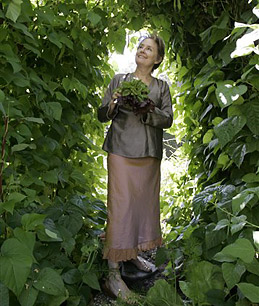
It has been a slow 30 years of progress for all environmentalists, but Alice Waters has more right than most to be frustrated. She wasn't asking anyone to install solar panels or convert their engines to run on biofuels — she just wanted people to eat stuff that tastes better. And it wasn't like she was simply making claims that local, organic food tastes great. She was proving it every day at Chez Panisse, the Berkeley, California, restaurant she opened in 1971 — a restaurant so good (the James Beard Foundation named Waters America's best chef in 1992 and Gourmet named Chez Panisse America's best restaurant in 2001) that it doesn't even have a menu. You eat what Waters found at the markets that day, and you like it. You really like it.
Waters says she's thrilled that her cooking theories — fresh, local ingredients, simply prepared — have gone mainstream, thanks to health studies and the farmers' market movement. It's much easier to grasp this philosophy of food when you're at the farmers' market, she says. "When people become real and you learn about your compost and how easy it is to make, you feel like you're empowered to do an everyday act that's good for your family and friends and the environment."
While Waters' restaurant and cook-books are credited with launching the locavore movement in the U.S., her Edible Schoolyard project goes one step further. Started in 1994, it encourages students in Berkeley to help grow and shop for their lunches, and it has shown results not just in environmental awareness, but in tackling obesity. Now it's being tried in other cities. "Remember when Kennedy put physical fitness in schools?" Waters asks. "We had to exercise four times a week, and we all went for it. We need that kind of passion. Going into public schools and teaching [children] about the consequences of the food that they eat can have remarkable results."
Waters, 64, is generally hopeful, not least about Barack Obama. "We need a President to speak about the issues of food, nourishment and stewardship," she says, "and I have great hope that will happen." She is also optimistic about the Slow Food movement, which she says is banding nations together to find the best heirloom varieties of fruits and vegetables to plant for sustainability and nutrition — and, of course, taste. Because that's how Waters wins any debate about the environment.